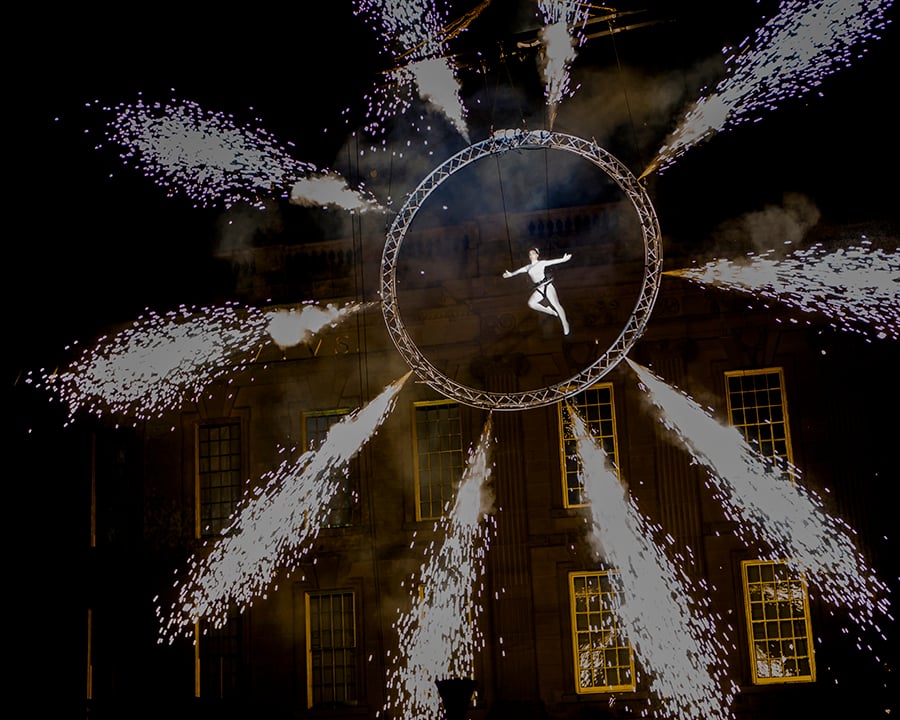
Performance within Elemental Force project
Recovering from shock
Times of austerity and pending funding cuts from the public purse are actually opportunities to develop new ways of working, potentially leading to greater long-term sustainability, according to Stephen Munn.
When Derby City Council announced in October 2011 that funding to arts organisations would be reduced to zero over a three-year period, the news was naturally met with shock. However, this was quickly followed by the realisation that, with public funding reducing, we at Déda needed to find ways to move forwards and make our organisations in the city more sustainable.
Déda’s roots are firmly set as a regional dance house, a base for our dance development, youth and class programmes and bringing high-quality, contemporary dance and music performances to the city. And, while keen to develop new areas of work, we were adamant to hold firm to our mission with dance at our core and therefore looked at two directions for growth: education and producing large outdoor performances.
Education was a natural progression as one of our strengths is youth development − working with young people both at Déda from an early age through to our academy programme. We also started discussions with the University of Derby around developing a degree programme. The degree plans were an important part of our successful capital bid to Arts Council England (ACE) to extend our studio and theatre resources. The new facilities, due for completion in September 2014, will enable us to create a niche in dance higher education with a dance degree based within a professional dance house, enabling students to benefit from first-class facilities and to work alongside professionals from programming to producing. It also increases our capacity to present larger performances at our venue in the city centre, increasing income generation.
It has been crucial to stay true to our core purpose with dance and movement
Producing is the second area of development, and in 2009, knowing the funding cuts were on the way, we started investigating new income streams through staging large-scale outdoor performances. A milestone was being selected by the Legacy Trust UK to produce ‘Games Time’ as part of London Festival 2012. We presented four outdoor spectaculars in the East Midlands which brought together professional performers and 480 community volunteers performing to a combined audience of 46,000. It brought together a creative team comprising of artistic director Lea Anderson, Mahogany Arts and Walk the Plank.
Its success led to an approach from ACE to develop ‘Elemental Force’, a cultural tourism project that looks at creating partnerships between the arts, tourism and local economic partnerships. Elemental Force is a series of four large, outdoor projections with aerial performance and pyrotechnics at iconic buildings in Derbyshire and Nottinghamshire bringing local cultural and industrial heritage to life. We are now sharing the learning of these projects and our future plans with fellow regional professionals and organisations through the On Site programme, researching the future capacity for producing outdoor work.
The funding cuts have therefore focused our minds to quickly develop new areas of work and, in a short space of time, we have evolved from our dance house roots into further complimentary strands within the organisation. So what have we learnt through this development? Despite evolving, it has been crucial to stay true to our core purpose with dance and movement at the heart of everything we do.
Déda Producing’s success lies in its formation as a hub model, bringing in other professionals on a project basis rather than adding to our core costs. This entrepreneurial approach has given us the flexibility to respond to developing markets and this experience has further influenced other areas of the organisation to respond and meet the needs of changing agendas such as arts and health. Although new areas of work have generated income to support our core business, we are clear that they are not replacing this work or taking priority. Every strand has its part to play, and sustainability across the board is crucial to our future.
We have had to be strict with resource management and recognise that there will be shorter periods of intense activity which need to be closely monitored so as not to put undue pressure on other areas of work.
And we have recognised the need to clearly communicate the objectives of change across the organisation so that staff see the bigger picture and take ownership of new areas of work.
Finally, rather than seeing local authorities as funding providers, these changing times have focused our minds on opening a dialogue about what else we can bring to the table, in addition to our important contribution to the cultural life of the city, county and region. For example, delivering cost-effective services in order to meet the personalisation agenda can help the local authority achieve its own goals, even as its budgets are further reduced by central government. We and other cultural organisations in the city are also involved in a process which is exploring a new cultural vision for Derby, including looking at a collaborative approach to efficiencies within the sector.
As arts organisations, we are all facing a changing world with high levels of risk where the outcomes are unknown. But, by changing our mindset to regard different ways of working not as a threat but as a possible opportunity, we think we can better embrace new prospects and secure the future of our core business, complemented by innovative and exciting programmes.
Stephen Munn is Director of Déda.
Join the Discussion
You must be logged in to post a comment.